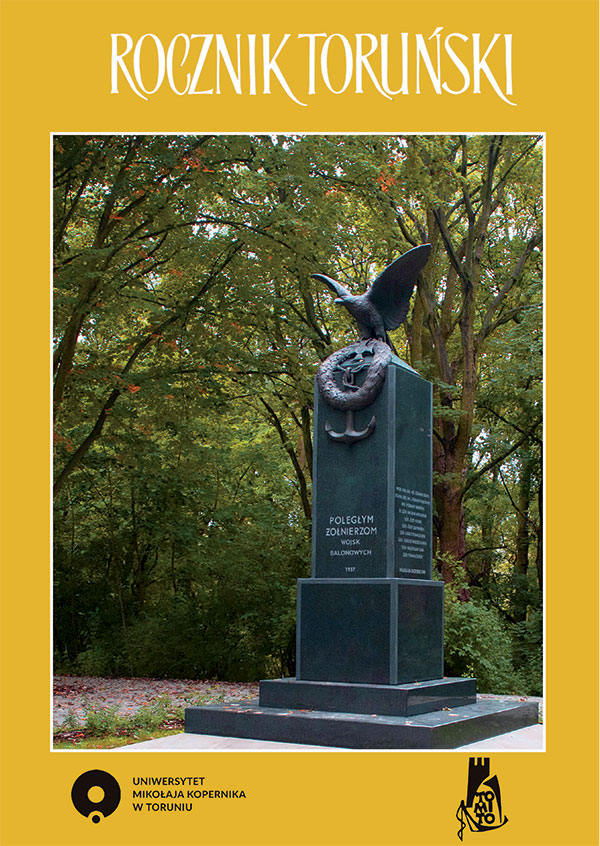Die Holländer in den Gütern der Leslauer Bischöfe bei Thorn - Otłoczyn und Brzoza
DOI:
https://doi.org/10.12775/RT.2020.002Ključne riječi
Holländische Ansiedlung, Olender, Bistum Leslau, Gegenreformation, Brzoza, OtłoczynSažetak
Brzoza und Otłoczyn sind Dörfer in der Weichselniederung in der Nähe von Toruń. Vom Mittelalter bis zum Ende des 18. Jh. gehörten sie zur Ausstattung der Bischöfe von Włocławek/Leslau. In der ersten Hälfte des 17. Jh. haben die Bischöfe Wawrzyniec Gembicki und Maciej Łubieński auf ihrem Gebiet “Olender” [poln. mundartl. – Holländer] angesiedelt. So wurden hier Siedler bezeichnet, die sich auf Bewirtschaftung schwer zu kultivierender, häufig feuchten Gebiete spezialisiert haben, die von ihnen langfristig gepachtet wurden. Im Beitrag wurde ein reicher Quellenbestand ausgewertet, der im Diözesanarchiv in Włocławek aufbewahrt wird, um die wichtigsten Fragen der Anwesenheit der Holländer in Otłoczyn und Brzoza zu präsentieren. Die Siedler erschienen hier viel später als auf anderen Gebieten im unteren Weichsellauf (Otłoczyn - 1613, Brzoza - 1631), was mit der Abneigung der Bischöfe gegenüber den Ankömmlingen, die protestantisch waren, zusammenhängen durfte. Die Analyse ihrer Nachnamen zeigt, dass Lutheraner aus deutschen Ländern unter ihnen dominierten. Die Holländer erhielten günstige wirtschaftliche Bedingungen, die typisch für das sog. Holländerrecht waren, jedoch wurde ihnen verboten, ihre Religion öffentlich zu praktizieren und im protestantischen Geiste zu lehren. Dennoch brachte die Ansiedlung der Holländer in beiden Orten dauerhafte und positive Ergebnisse. Die Lebensbedingungen der hiesigen Holländergemeinden haben sich erst in der ersten Hälfte des 18. Jh. wesentlich verändert, als der Bischof Krzysztof A. Szembek die Protestanten zwang, zum Katholizismus zu konvertieren bzw. die beiden Dörfer zu verlassen, und dann neue, weniger günstige Pachtbedingungen einführte. Infolge dieser Entscheidung erlebten Otłoczyn und Brzoza in den folgenden Jahrzehnten eine Phase wirtschaftlicher Stagnation, und ihre Bevölkerung wurde polonisiert.
References
Birecki P., Gmina Wielka Nieszawka. Szkice z dziejów, Wielka Nieszawka 2010.
Cackowski S., Gospodarstwo wiejskie w dobrach biskupstwa i kapituły chełmińskiej w XVII-XVIII w., T. 1: Gospodarstwo chłopskie, Toruń 1961.
Chodyła Z., Zarys dziejów osadnictwa olęderskiego w Polsce, [in:] Olędry. Przestrzenie wokół nas, Poznań 2006, S. 32-69.
Ciesielska K., Osadnictwo „olęderskie” w Prusach Królewskich i na Kujawach w świetle kontraktów osadniczych, Studia i Materiały do Dziejów Wielkopolski i Pomorza, B. 4, 1958, H. 2, S. 219-255.
Fijałek J., Ustalenie chronologii biskupów włocławskich, Kraków 1894.
Guldon R., Guldon Z., Osadnictwo województwa inowrocławskiego w latach 1775-1789, „Ziemia Kujawska”, t. 6, 1981, S. 99-113.
Guldon Z., Kabaciński R., Przywileje lokacyjne Przyłubia z lat 1359-1594, [in:] Dokumenty do dziejów Kujaw i ziemi dobrzyńskiej XIV-XIX w., Warszawa-Poznań 1974, S. 23-27.
Heuer R., Die Holländerdörfer in der Weichselniederung um Thorn, Mitteilungen des Coppernicusvereins für Wissenschaft und Kunst, H. 42, 1934, S. 122-155.
Inglot S., Stosunki społeczno-gospodarcze ludności w dobrach biskupstwa włocławskiego w pierwszej połowie XVI w., Lwów 1927.
Kalinowski J. K., Wawrzyniec Gembicki jako biskup chełmiński i pomezańskiej diecezji wieczysty administrator (1600-1610), Toruń 2011.
Klassen P. J., Menonici w Polsce i Prusach w XVI-XIX w., Toruń 2016.
Kriegseisen W., Ewangelicy polscy i litewscy w epoce saskiej (1696-1763). Sytuacja prawna, organizacja i stosunki międzywyznaniowe, Warszawa 1996.
Kuras K., Szembek Krzysztof Antoni, [in:] Polski Słownik Biograficzny, B. 48, H. 196, Warszawa-Kraków 2012, S. 81-89.
Maercker H., Geschichte der ländlichen Ortschaften und der drei kleineren Städte des Kreises Thorn, Danzig 1899-1900.
Mielke E., Schlonsk. Chronik eines deutschen Dorfes an der Weichsel in Mittelpolen, Dortmund 1972.
Raczyński M., Materjały do historii Ciechocinka od zapoczątkowania budowy warzelniów soli do wybuchu wielkiej wojny, Warszawa 1935.
Rudolph Ph., Z historii Solca Kujawskiego i okolicznych wsi, Solec Kujawski 2003.
Downloads
Objavljeno
How to Cite
Broj časopisa
Rubrika
Stats
Number of views and downloads: 773
Number of citations: 0



